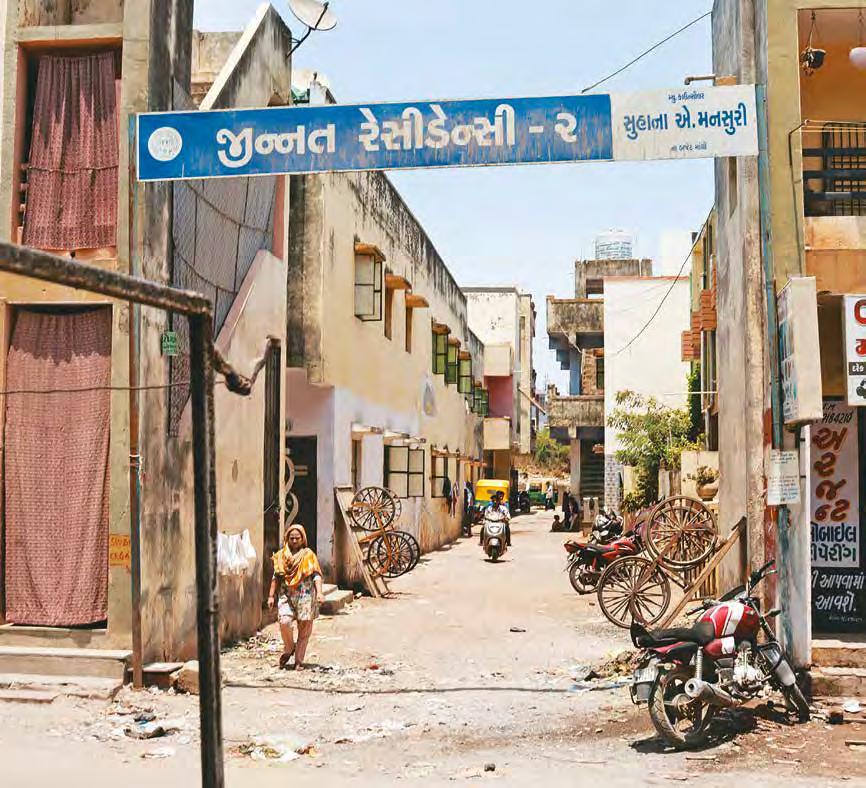
THE vast stretches of the main road of Sarkhej, Ahmedabad, become narrower, the buildings smaller and more congested as you take a detour and enter into what is known as India’s largest urban Muslim ghetto. Surrounded by settlements of the riot-hit minority community, the lanes lead up to a towering brick wall with fencing on top, built with the sole purpose of separating the Muslim population from its neighbouring Hindu colony, Vejalpur. This is Juhapura, an area located just a few kilometres away from the heart of Gujarat’s largest city, Ahmedabad. While it was founded as a rehabilitation project for the flood-hit victims in 1973, the area took a whole new meaning with a series of communal tensions over the next few decades.
The contrast here is stark: tall buildings lining up the Hindu colony, and waterlogged lanes, crumbling small houses and the poor economic conditions in the Muslim settlement. The streets of Juhapura are brimming with autorickshaws and cycles, lined on either side by meat shops, barber shops, mechanics and offices of travel and estate agents. It is usually at its busiest when the sun is up and shining. The bylanes open into multi-storeyed concrete structures stacked up like Lego blocks. Inside, the rooms are small and functional, housing a family of four or more and bearing the weight of an urban life amidst neglect and decay.
Shagufta Anjum, 38, lives on one of these lanes of Juhapura area. Early in the morning, as she prepares to get ready for the day, she calls out to her brother looking up to the corridor outside a cramped nine-by-nine room, “Switch off the pump. There has been no water since yesterday.”
“Today is jumma,” she turns to us and says. “But look, we don’t even have water to bathe. See how much the government is doing for us.”
This story is from the {{IssueName}} edition of {{MagazineName}}.
Start your 7-day Magzter GOLD free trial to access thousands of curated premium stories, and 9,000+ magazines and newspapers.
Already a subscriber ? Sign In
This story is from the {{IssueName}} edition of {{MagazineName}}.
Start your 7-day Magzter GOLD free trial to access thousands of curated premium stories, and 9,000+ magazines and newspapers.
Already a subscriber? Sign In

Layers Of Lear
Director Rajat Kapoor and actor Vinay Pathak's ode to Shakespeare is an experience to behold

Loss and Longing
Memories can be painful, but they also make life more meaningful

Suprabhatham Sub Judice
M.S. Subbulakshmi decided the fate of her memorials a long time ago

Fortress of Desire
A performance titled 'A Streetcart Named Desire', featuring Indian and international artists and performers, explored different desires through an unusual act on a full moon night at the Gwalior Fort

Of Hope and Hopelessness
The body appears as light in Payal Kapadia's film

Ruptured Lives
A visit to Bangladesh in 2010 shaped the author's novel, a sensitively sketched tale of migrants' struggles

The Big Book
The Big Book of Odia Literature is a groundbreaking work that provides readers with a comprehensive introduction to the rich and varied literary traditions of Odisha

How to Refuse the Generous Thief
The poet uses all the available arsenal in English to write the most anti-colonial poetry

The Freedom Compartment
#traindiaries is a photo journal shot in the ladies coaches of Mumbai locals. It explores how women engage and familiarise themselves with spaces by building relationships with complete strangers

Love, Up in the Clouds
Manikbabur Megh is an unusual love story about a man falling for a cloud. Amborish Roychoudhury discusses the process of Manikbabu's creation with actor Chandan Sen and director Abhinandan Banerjee